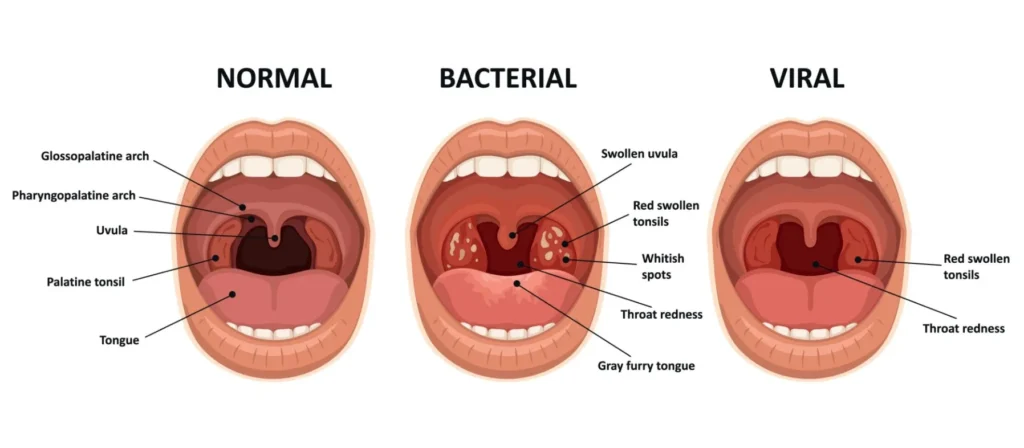Strep Throat Symptoms,Causes, Diagnosis, and Treatment

Share This Post
Strep Throat (Streptococcal Pharyngitis)
Strep throat, medically known as streptococcal pharyngitis, is a bacterial infection affecting the throat and tonsils. It’s caused by Group A Streptococcus bacteria and is highly contagious. Individuals of any age can contract this infection, though it’s more common in children. The bacteria spread through respiratory droplets, making close contact or sharing contaminated objects primary mode of transmission. This article provides an in-depth understanding of Strep Throat Symptoms, diagnosis, treatment, potential complications, and preventive measures.
Overview
Strep throat, also known as streptococcal pharyngitis, is a contagious bacterial infection primarily affecting the throat and tonsils. It’s caused by Group A Streptococcus bacteria and commonly spreads through respiratory droplets. Symptoms include throat pain, difficulty swallowing, and swollen tonsils. Prompt diagnosis and treatment are crucial to prevent complications and curb its spread.
Alternative Names
Strep throat is also referred to as streptococcal pharyngitis or strep pharyngitis in medical terminology.
Causes
Strep throat is primarily caused by the bacterium Group A Streptococcus. This highly contagious infection spreads through respiratory droplets when an infected person coughs, sneezes, or even talks. Direct contact with contaminated surfaces or sharing items, like utensils, can also transmit the bacteria. Factors like crowded environments or close contact with an infected individual heighten the risk of contracting strep throat.
Strep Throat Symptoms
- Sudden and severe sore throat
- Painful swallowing
- Red and swollen tonsils, sometimes with white patches
- Fever, typically higher than 101°F (38.3°C)
- Headache and body aches
- Nausea or vomiting, especially in children
- Swollen lymph nodes in the neck
- Rash (scarlet fever) in some cases
These symptoms may vary in severity among individuals. If you suspect strep throat, consult a healthcare professional for accurate diagnosis and treatment.
Exams And Tests
Diagnosing strep throat often involves a physical examination and a throat swab to test for the presence of Group A Streptococcus bacteria. Healthcare providers may conduct a rapid strep test, providing results within minutes, or opt for a throat culture if the rapid test is inconclusive. Throat cultures take longer but are more accurate. Additionally, doctors may consider symptoms, medical history, and sometimes, blood tests to rule out other conditions. Seeking prompt medical attention and adhering to the recommended testing procedures help confirm the diagnosis and guide appropriate treatment.
Treatment
- Antibiotics: Healthcare providers typically prescribe antibiotics, such as penicillin or amoxicillin, to combat strep throat. Completing the full course is crucial to prevent complications and curb bacterial resistance.
- Symptom Relief: Over-the-counter pain relievers like ibuprofen or acetaminophen help alleviate discomfort and reduce fever.
- Hydration and Rest: Adequate hydration and ample rest support the body’s healing process and ease symptoms.
- Warm Fluids and Throat Soothers: Drinking warm liquids, gargling with salt water, or using throat lozenges can soothe a sore throat.
- Avoiding Spread: Minimize contact with others until at least 24 hours after starting antibiotics to prevent transmission.
Adhering to prescribed treatment and self-care measures aids recovery and prevents the spread of the infection. Consulting a healthcare professional is vital for personalized treatment guidance.
Outlook (Prognosis)
With proper treatment, most individuals recover from strep throat within a week and without complications.
Possible Complications
- Rheumatic Fever: Untreated strep throat can lead to rheumatic fever, causing heart inflammation.
- Post-streptococcal Glomerulonephritis: Inflammation of the kidneys may occur, affecting their function.
- Sinus or Ear Infections: Bacterial spread can lead to infections in the sinuses or ears.
- Abscess Formation: Rarely, abscesses may develop in the throat or tonsils.
- Scarlet Fever: In some cases, strep throat is accompanied by a rash known as scarlet fever. Seeking timely medical care reduces these risks significantly.
When To Contact A Medical Professional
- Persistent or severe sore throat lasting longer than 48 hours
- Difficulty breathing or swallowing
- High fever, especially above 101°F (38.3°C)
- Swollen lymph nodes or rash
- Recurrent strep infections or concerns about symptoms warrant prompt medical evaluation to ensure appropriate treatment.
Prevention
- Hand Hygiene: Regular handwashing helps minimize bacterial spread.
- Avoid Close Contact: Limit exposure to individuals with strep throat.
- Cover Mouth and Nose: Encourage covering the mouth and nose when coughing or sneezing.
- Cleanliness: Disinfect frequently touched surfaces.
- Personal Items: Avoid sharing utensils or personal items to prevent transmission. These practices reduce the risk of contracting or spreading strep throat.
References
